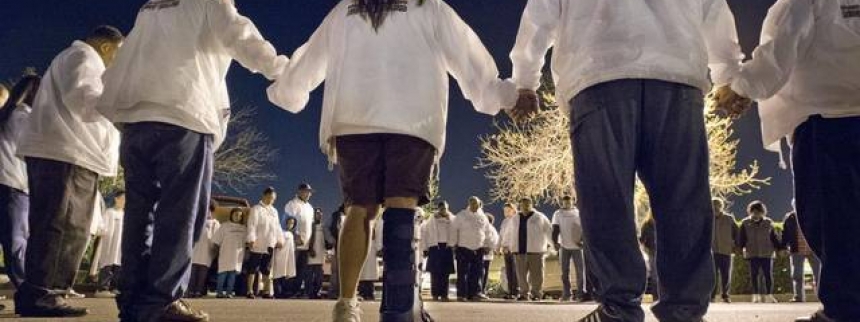
We believe a Catholic vision of crime and criminal justice can offer some alternatives. It recognizes that root causes and personal choices can both be factors in crime by understanding the need for responsibility on the part of the offender and an opportunity for their rehabilitation. A Catholic approach leads us to encourage models of restorative justice that seek to address crime in terms of the harm done to victims and communities, not simply as a violation of law.
Responsibility, Rehabilitation, and Restoration, U.S. Conference of Catholic Bishops (USCCB), 2000, #37-38.
What is Restorative Justice?
Restorative Justice is a philosophy and an approach that looks at conflict and harm through the lens of all impacted and works collectively to bring them into right relationship with God and one another.
It holds offenders accountable even as it opens paths to healing, especially with victims. And it addresses the needs of everyone impacted by crime: victims, offenders, families, communities, and those working in the criminal justice system.
In our Restorative Justice work, we advocate, educate and provide pastoral care. The Gospel calls us to follow Jesus Christ's example of faith, hope and love. Through Jesus, God reaches out to the broken, the poor, the sick and the imprisoned. We, along with the California Catholic Conference, seek a restorative justice model to empower the Church to heal our communities damaged by crime and violence.
In following Jesus Christ's example, we focus on 4 areas in restorative justice:
- Prophetic Witness: Our Church, as a prophetic witness to peace and justice, to truth and freedom "so that people may be raised up to a new hope" (Eucharistic Prayer).
- Compassion and Healing: Practicing compassion and healing justice for survivors of crime and violence, offenders, peace officers, and their families and communities.
- Respect and Dignity of Life: Creating a society that is more just and respects human dignity of all, stops the use of inhuman practices, end policies that criminalize and separate families.
- Accompaniment and Prayers: Offering pastoral care and accompaniment to crime and violence survivors, and their families, on their healing journey and restoring their lives to the extent possible.
Pray with Us!
Our Programs
Detention Ministry: The mission of the detention ministry of the Diocese of Sacramento is to provide a Catholic presence and ministry to men, women and children incarcerated in county jails, state prisons, and youth detention facilities located within our Diocese. How to get involved in Detention Ministry
Get on the Bus: Provides free transportation to children of incarcerated mothers and fathers and their caregivers to 14 California State Prisons for a visit around Mother’s Day and Father's Day. For more information about the Get on the Bus program, click here.
Exodus Re- Entry Mentoring Programs: is a spiritually-based mentoring program accompanying men and women for up to two months prior to release and six months after release from incarceration in Sacramento County correctional facilities.
Resources
What does the Church say on Restorative Justice?
- Responsibility, Rehabilitation, and Restoration: A Catholic Perspective on Crime and Criminal Justice: 2016 Pastoral Letter from U.S. Catholic Bishops remind us that "our response to crime in the United States is a moral test for our nation and a challenge for our Church".
How can we accompany survivors of crime and violence?
Victims and survivors of crime and/or violence need pastoral care and accompaniment. We encourage clergy, ministry leaders, and community members to use these resources to provide pastoral care to those suffering in our communities.
How do we respect the dignity of the incarcerated?
Catholic Campaign to End the Use of the Death Penalty: In December 2005, the Bishops launched a campaign to abolish the death penalty in the United States. The campaign web site provides educational materials and resources explaining Catholic teaching on the death penalty, as well as suggestions for involvement.
Restore Justice: An online resource of the California bishops which provides inspiration, hope and resources for anyone who has been touched by the criminal justice system and offers a uniquely Catholic perspective of hope and healing.
.
Events
“National Crime Victims’ Week (April 21-27, 2024) is a time to focus attention on the needs of our brothers and sisters who have been impacted by crime during the year. In recognition of those impacted by crime, the Restorative Justice Committee of the California Catholic Conference has issued the following statement.
In conjunction with the commemoration of National Crime Victims’ Rights Week, the Catholic bishops of California have released a new pastoral resource to help guide pastors in ministering to victims of violent crime. They have also produced prayers of the faithful in Spanish and English.

